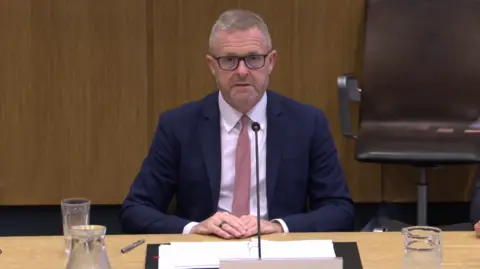Senedd to rule on assisted dying after next election
 Getty Images
Getty ImagesA decision to provide assisted dying services in the Welsh NHS would not come until after the next Senedd election in May 2026, a minister has said.
A committee heard on Tuesday that if the UK Parliament decides to legalise the practice the Senedd would have to vote on whether the service is available in the public sector.
Health Secretary Jeremy Miles said a "significant amount of work" will be needed to prepare, with most of it falling to the next Welsh government.
The committee also heard ministers would have to consider whether assisted dying would only be available to those who could afford it in the private sector if the Senedd blocked access.
The current crop of 60 Senedd politicians rejected a proposal on assisted dying last year.
It has a significant decision to take before the election when it votes on whether Kim Leadbeater's legislation should apply in the areas it usually controls.
However it is not legally binding, and it would still be for a government formed after the next Senedd election to decide whether to provide a service on the NHS, and for the new Welsh Parliament to agree to it in a further vote.
Under Leadbeater's bill assisted death for terminally ill people would be legalised in England and Wales regardless of what the Senedd decides.
That means the decision the Welsh Parliament faces is about how or if it is provided - and not whether it's a criminal offence.
As is usual with matters of conscience, Labour, the Welsh Conservatives, Reform and the Liberal Democrats said they would maintain a neutral position on the issue at the next election.
Plaid Cymru has allowed its politicians a free vote in the past.
Kim Leadbeater's bill has passed the House of Commons and now has to be examined by the House of Lords before it becomes law.
There is a difference of opinion within the Senedd's three main parties and Jeremy Miles was among the ministers who opposed the assisted dying vote in the Senedd last October.
He told BBC Wales he remained opposed to the legislation - "that is still my view", he said.
The legislation gives the Welsh government the power to set the legal rules for how an assisted dying service would be provided by the NHS.
Miles told the Senedd's health committee on Wednesday morning said the Welsh government "would need to make a policy decision to be open to introducing the service".
The health secretary said that given the "timing of the legislation and the Senedd term" that would "effectively be a government in the new Senedd".
Pushed by Tory chair Peter Fox on whether the government could choose to refuse to implement elements of the bill, Miles said: "In devolved competence, certainly".
"And even if the government wanted to and the Senedd didn't want to approve it the Senedd would have that ability as well".
Labour MS John Griffiths asked what the implications would be for the Welsh NHS if the Senedd voted against.
Miles said if a service was operating in England, but not in Wales because of the Senedd or because of timing, "the sorts of things we would be thinking about [are] people crossing the border for services, distances to services" and "equality of experience".
Miles said there would be "options in England and Wales for services to be provided other than in the public sector".
"The Welsh government already has regulatory powers in relation to some independent healthcare provision, so the precise mix of regulatory powers for non-public provision in Wales would depend upon who is providing it and what they are providing."
 Senedd Cymru
Senedd CymruRaising the idea that some people could access assisted dying services privately, Conservative MS James Evans said: "You could have a situation in Wales where those who could afford to pay for assisted dying could access it, and those who cannot afford it would not be able to access it."
Asked if the "equality of access to the service" would need to be a consideration for future ministers, Miles said "yes".
However, he pointed out there were lots of decisions to make before that scenario could arise.
Miles told the committee that the legislation provides for services to be implemented "no later than October 2029".
"There's a substantial period of time, but there are a number of things which, both in Wales and England, would need to be settled in advance of that.
"Who is providing the service, where, what the workforce implications of that are," he said.
"There's a very significant level of work that would need to follow from the decision by a government that they are open to introducing this service."
The first vote on the legislation in the Senedd - a legislative consent motion (LCM) - is expected later this year.
It would not decide how a service is provided but would indicate whether this Senedd is happy for the UK Parliament to legislate.
It is not legally binding but the vote is meant to be respected by Westminster.
Miles indicated it would be "influential" on decisions taken by the Welsh government whether to press ahead or not.
Additional reporting by Cemlyn Davies
